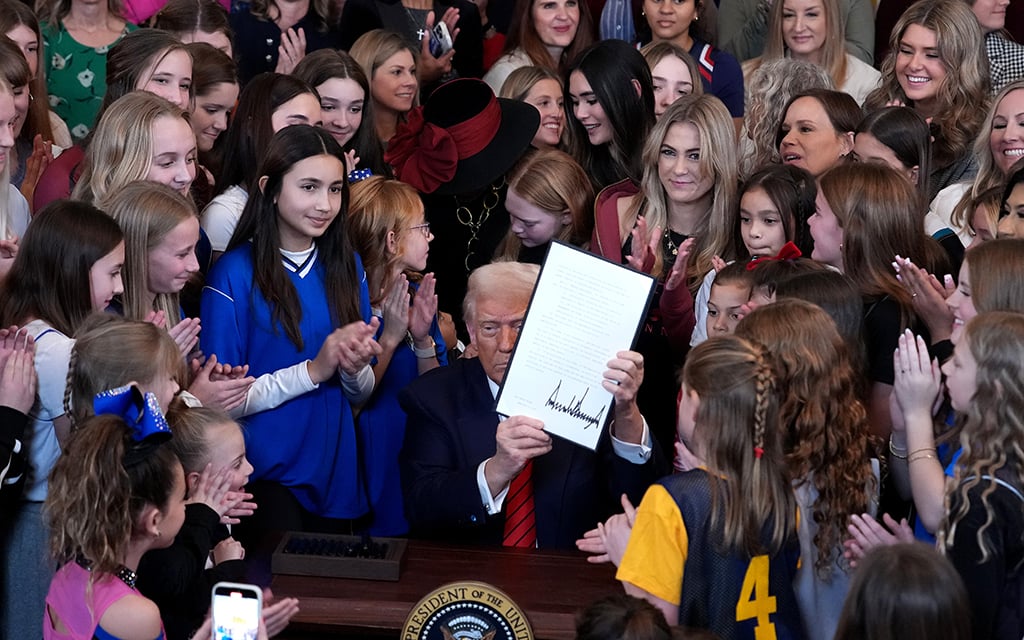PHOENIX – On an April morning in Maine, a legal challenge against the U.S. Department of Agriculture was filed. At the center: not food regulation, nutritional guidelines, or even the price of eggs, but rather identity, politics and the question of who gets to play.
The catalyst was the USDA’s freeze on federal funding for food insecurity programs, which the Trump administration used as leverage in a larger fight that spans from gymnasiums to statehouses across the nation.
The conflict began after Maine Gov. Janet Mills chose to ignore a Feb. 5 executive order from President Donald Trump – titled “Keeping Men Out of Women’s Sports” – which bars transgender women and girls from participating in female athletics.
A federal judge has since ordered the Trump administration to unfreeze funds for the food program. The judge also granted a temporary restraining order for Maine against the USDA.
Across the country, the issue of transgender athletes has been contentious, but a New York Times/Ipsos poll from January found that the majority — on both sides of the political spectrum — oppose allowing transgender women to compete in women’s sports.
In Arizona, the question was settled two years ago when lawmakers passed a bill to ban transgender girls from joining girls’ teams. But Maine, unlike Arizona, won’t concede without a fight.

As discussions around President Trump’s executive order continue, transgender athletes like Lia Thomas are at the center of the debate about fairness in women’s sports. (Photo by Rich von Biberstein/Icon Sportswire via Getty Images)
Trump’s executive order bans transgender women and girls from competing in female sports based on views that gender is based on biological sex assigned at birth and not gender identity. It cites Title IX, the landmark 1972 civil rights law that prohibits sex-based discrimination from any federally-funded educational programs.
The president plans to enforce the executive order by threatening a loss of federal funds to states and schools that do not comply, leaving many divided on the subject.
“As some Federal courts have recognized, ‘ignoring fundamental biological truths between the two sexes deprives women and girls of meaningful access to educational facilities,’” the executive order states.
Not everyone disagrees, including Concerned Women for America – a group that protects and promotes Biblical values and Constitutional principles through prayer, education and advocacy.
“Concerned Women for America proudly applauds President Trump’s February 5, 2025, executive order, ‘Keeping Men Out of Women’s Sports,’ which fulfills his promise to protect the dignity and fairness of women’s athletics,” Penny Nance, CEO and President of Concerned Women for America, said in a statement. “We stand with President Trump in restoring common sense and safeguarding the integrity of women’s sports for future generations.”
Another supporter is the Independent Women’s Forum, a 501c3 nonprofit organization that celebrates women’s accomplishments and fights to expand women’s options and opportunities. The organization has been heavily involved with the order, with IWF spokeswomen attending the White House signing of the order.
This is what it means to stand with women & girls!!
Thank you, @POTUS. pic.twitter.com/JFakQOauLW
— Independent Women's Forum (@IWF) February 5, 2025
With regards to Title IX, there’s disagreement about how it applies to the executive order.
Beth Parlato, a senior legal advisor for IWF, believes Title IX’s intent was to promote fairness between males and females in sports.
“Look at where we are now with women playing professional sports, and it’s become a livelihood and sports are beyond athletics,” Parlato said. “It gives women so much opportunity throughout their whole life.
“That was the intent. The intent was always that you have two sexes, male and female, there was never any intent to allow men into women’s sports. That’s going backwards.”
Parlato, who gained opportunities through Title IX, believes that there isn’t a warranted compromise to the executive order.
Rachel Berg represented two transgender girls in the legal case Doe V. Horne regarding Arizona’s ban of female transgender athletes as a staff attorney for National Center for Lesbian Rights. The case is currently ongoing after the 9th Circuit of the U.S. Court of Appeals blocked the ban in September.
Unlike Parlato, Berg and the NCLR view the executive order as unconstitutional, not through Title IX, but through the equal protection clause and federal and state civil rights statutes.
Trump and Mills clashed at the White House regarding the executive order after the Trump administration found that the Maine educational department failed to comply with the executive order. As a result, the government will discontinue $4.5 million in federal funding to the University of Maine’s Sea Grant program.
“I have seen that back and forth,” Berg said about the Maine confrontation. “Our view is that this executive order doesn’t require anyone to do anything, and even if it does, it’s unconstitutional.”
Parlato and the IWF say schools are complying because they cannot afford to lose their federal funding.
In Arizona, LGBTQ+ advocacy groups have concerns about the executive order, including Education Action Alliance, formerly GLSEN Arizona Chapter. GLSEN was active for about 22 years in Arizona, working on LGBTQ advocacy, but transformed into the EAA focusing on freeing school communities from discrimination.
EAA Board President Madelaine Adelman, an anthropologist and ASU professor since 1997, says there is concern from parents about how students will be protected in school and the Arizona Department of Education’s support for discriminatory moves. She says sports are a big part of U.S. culture and children enjoy playing and learning from sports.
“All children should have access to that kind of opportunity to feel comfortable moving their bodies, being part of a team, developing skills,” Adelman said. “Sports can be a really positive space and that all children should have access to that space. It’s also been a space that hasn’t been very friendly to queer young people, but that can be improved.”
Tami Staas is the Executive Director for the Arizona Trans Youth and Parent Organization, which is aimed at supporting children and families exploring children’s gender identity and expression. Staas, an elementary school teacher in Mesa, began going to AZTYPO as a parent when her son began transitioning. However, her role changed over time from a facilitator and volunteer to a board member and now executive director.
Staas believes there is an obsession with transgender girls playing sports, and says she doesn’t understand Trump’s focus on the issue, when according to NCAA President Charlie Baker, fewer than 10 transgender athletes are currently playing in the NCAA.
“Just like any other young girl or athlete, soccer is her life,” Staas said about a transgender girl who plays soccer. “She loves it, she loves the game, she plays it all the time. Her fear is that she won’t be able to play, that this thing that she loves is going to be taken away from her and that she won’t longer have access to do the thing that she loves. It’s a choice between her identity and something she loves.”

The Independent Women’s Forum supports the Trump administration’s stance on transgender athletes, citing concerns about fairness in women’s sports. (Photo courtesy of The Independent Women’s Forum)
Despite the executive order, AZTYPO aims to help these young transgender athletes by connecting them to other families and to legal resources if they are facing discrimination and are interested in pursuing litigation.
The IWF receives incident information almost daily, such as emails about a transgender female using a female locker room. In many cases, the IWF advises the parents to contact the administration and school board.
“Usually, that’s the way we want to handle it,” Parlato said. “We don’t want to get involved personally within every incident that we hear about, but we can aid and help and give advice to the parents of how they can go about this issue.”
The University of Pennsylvania lost $175 million in federal funding in late March because a transgender athlete competed on the school’s 2022 swimming team, according to the president J. Larry Jameson.
Jameson says the school followed NCAA rules during that season and it also complies with the policy now. The loss in funding includes “research on preventing hospital-acquired infections, drug screening against deadly viruses, quantum computing, protections against chemical warfare, and student loan programs.”
Trump’s executive order may impact the 2028 Los Angeles Summer Olympics, the first Summer Olympics in the U.S. since the 1996 Atlanta Games. The order currently states the Secretary of State and the Secretary of Homeland Security shall review and adjust policies as needed with regards to “males seeking to participate in women’s sports, and shall issue guidance with an objective of preventing such entry to the extent permitted by law.”
According to the order, the Secretary of State may also review if the International Olympic Committee is determining eligibility based on biological sex and not gender identity, “to promote fairness, safety, and the best interest of female athletes.”
As for Maine, Mills said Monday that “it’s not rational” for Trump to freeze federal funding. Mills also said she was appalled by Trump’s attempt to “reinterpret” the law.
For now, the federal judge’s order stands, including the temporary restraining order against the USDA.



